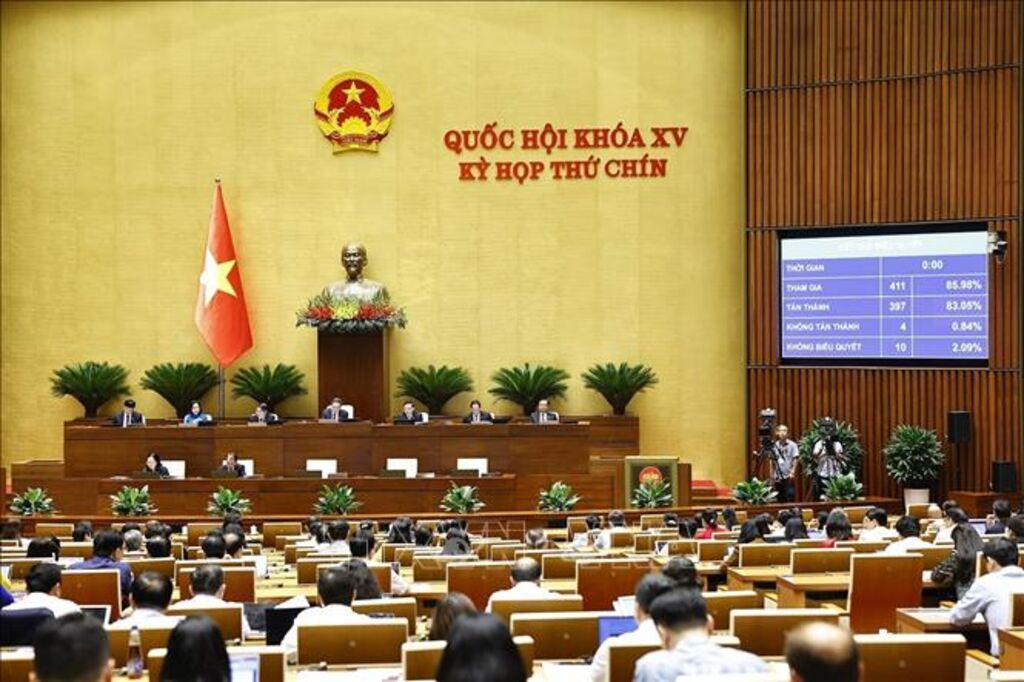 |
| National Assembly deputies cast their votes to adopt Resolution 206/2025/QH15__Photo: VNA |
At its 9th session, the 15th National Assembly officially adopted Resolution 206/2025/QH15 with 397 out of 411 deputies voting in favor. The Resolution establishes a special mechanism to promptly address legal obstacles arising from existing legal provisions, reflecting a shift in legislative thinking in line with the principle of “law in service of development.”
The issuance of Resolution 206 stems from strategic orientations outlined in Politburo Resolution 66-NQ/TW dated April 30, 2025, which sets forth the goal of “basically removing legal bottlenecks by the end of 2025” and “completing the development of a unified, consistent, and stable legal framework by 2027.”
Notably, Resolution 206 provides a flexible, interim solution that enables legal difficulties to be resolved in a timely manner. However, the Resolution explicitly excludes its application to matters involving human rights, fundamental rights and obligations of citizens that must be governed by law as stipulated in the Constitution; restrictions on human and citizens’ rights; criminal offenses and penalties; judicial procedures; and fundamental principles concerning the organization of the state apparatus.
Under the Resolution, a legal provision is considered an obstacle if it falls into one of the following categories: it conflicts with or overlaps with other provisions within the same or another legal document; it is unclear, open to multiple interpretations, unreasonable, or impractical, causing difficulties in implementation; or it imposes excessive compliance costs or hinders innovation and the development of new growth drivers.
The Resolution permits three remedial approaches to address such provisions: (i) interpreting laws or resolutions of the National Assembly, ordinances, or resolutions of the Standing Committee of the National Assembly, or issuing implementation guidance; (ii) promulgating legal documents under fast-track procedures to regulate new matters, or to amend, supplement, or replace existing provisions; and (iii) issuing resolutions by the Government or the Standing Committee of the National Assembly to temporarily suspend, defer, or adjust the effect of part of a legal provision.
The third approach is particularly noteworthy as a breakthrough, allowing for the rapid resolution of legal “bottlenecks.” However, its application is subject to strict conditions concerning legal authority, impact assessment, legal appraisal, and transparency. These resolutions will be effective only until February 28, 2027, and must be individually numbered in a format linked to Resolution 66—for example, “66.1/2025/NQ-CP” for a resolution issued by the Government.
The Resolution also sets out a clear implementation procedure, including: formulating a proposal; appraising the proposal within five working days; publishing the draft resolution on the National Law Portal; submitting it to a competent authority for promulgation; and submitting periodic reports to the National Assembly and its Standing Committee. The Ministry of Justice is assigned the role of “gatekeeper,” responsible for reviewing the constitutionality, legality, and consistency of proposals. Implementing agencies are required to explain and assume full responsibility before the National Assembly.
Resolution 206/2025/QH15 takes effect on the date of its adoption and remains effective until February 28, 2027. During this period, it serves not only as a regulatory relief tool but also as a transitional legal mechanism to support broader institutional reform. The National Assembly, the Government, and relevant authorities are expected to evaluate its implementation and use the findings to inform fundamental amendments to problematic legal provisions.- (VLLF)









